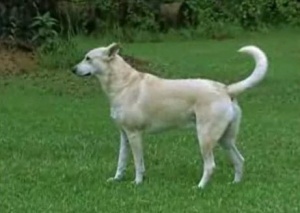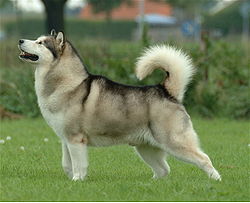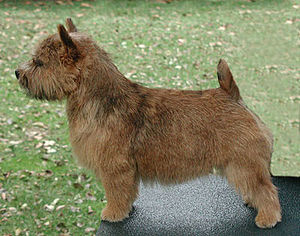 |
| Vital Statistics: |
| Place of Origin: United States |
| Group: Sighthound |
| Height: 17-24 in. |
| Weight: 30-44 lbs. |
| Life span: 12-14 yrs. |
| Trainability: high |
| Good with children: yes, with supervision |
| Good with other pets: yes, with supervision |
What is the origin of the Carolina Dog?
The Carolina Dog comes from the swamps and bottomlands of South Carolina and Georgia. It has many nicknames – American Dingo, Dixie Dingo, Native American Dog, Ol’ Yaller dog. Although an American breed, the Carolina Dog can trace its ancestry to primitive breeds such as the Australian Dingo. It is believed the dogs originated in Southwest Asia, crossed the Bering Land Bridge, tens of thousands of years ago into North America. From there they made their way south and east to the Carolinas.
What does the Carolina Dog look like?
The Carolina Dog is 17-24 inches tall and weighs 30-44 lbs. Ears are large and erect. Eyes are dark and almond-shaped. The coat is double, heavier in winter, short and smooth. Guard hairs over neck, withers and back stand up when alert. Colors are deep red with buff markings on muzzle and shoulders. They can have dark sabling over the back, tail and loins. They require regular brushing and checking ears for any signs of infection.
What is the temperament of the Carolina Dog?
Carolina Dogs are extremely intelligent. They do retain many wild instincts and require a lot of patience with positive training and lots of early socialization. Once trained they are loyal, devoted pets. They are good with children and other pets, but should be supervised. They are very adaptable and their activity level will match yours. However they need regular exercise.
What are the uses of the Carolina Dog?
Carolina Dogs were used for hunting. These days they compete in obedience, agility and herding. Some are used in search and rescue and as therapy dogs with Canine Good Citizenship Certification and Temperament Test Certification. And they are devoted companions.
Possible Health Issues
Generally healthy but can develop eye problems and hip/elbow dysplasia.
- Alaskan Klee Kai
- Alaskan Malamute
- American Cocker Spaniel
- American Eskimo Dog
- American Foxhound
- American Pit Bull Terrier
- American Stratfordshire Terrier
- Australian Shepherd
- Bichpoo
- Black and Tan Coonhound
- Blue Lacy
- Boston Terrier
- Boykin Spaniel
- Catahoula Leopard Dog
- Chesapeake Bay Retriever
- Chinook
- English Shepherd
- Maltipoo
- Mi Ki
- Miniature American Shepherd
- Mountain Cur
- Plott Hound
- Rat Terrier
- Redbone Coonhound
- Redtick Coonhound
- Silken Windhound
- Toy Fox Terrier
- Treeing Tennessee Brindle



